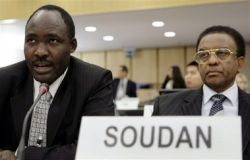UN rights council postpones vote on Darfur fact-finding mission
Dec 12, 2006 (GENEVA) — The UN Human Rights Council postponed a vote on whether to dispatch a fact-finding mission to Darfur and remained mired in debate, despite cries of alarm from senior UN officials about the situation in the strife-torn region of Sudan.
 The first ever special session on the situation in Darfur was extended into Wednesday as a rift between Western countries and their African and Islamic counterparts opened up again, despite a plea from outgoing Secretary General Kofi Annan for a united stance.
The first ever special session on the situation in Darfur was extended into Wednesday as a rift between Western countries and their African and Islamic counterparts opened up again, despite a plea from outgoing Secretary General Kofi Annan for a united stance.
The Council has long been criticized, especially by Annan and human rights groups, for not paying enough attention to Darfur while overly focusing on the Israeli/Palestinian dispute.
Annan said it was crucial that the 47 member nations in the Council agree to send a mission to Darfur headed by independent experts.
“I urge you to lose no time in sending a team of independent and universally respected experts to investigate the latest escalation of abuses,” he said in a recorded message to the council’s first ever session on abuses in Darfur.
“It is essential that this Council send a clear and united message to warn all concerned, on behalf of the whole world, that the current situation is simply unacceptable and will not be allowed to continue,” he added.
Sudan claimed during the session that it was being unfairly targeted, and criticized the UN Human Rights Commissioner Louise Arbour.
“The objective … is not to protect human rights but to undermine the dignity and the sovereignty of the weak states,” said the deputy governor of South Darfur, Mustafa Farah.
He also castigated media coverage of the situation in Darfur, saying it involved a litany of lies, repeated daily “until such lies seem to be the truth.”
The United Nations estimates that some 200,000 have died and two million people have been forced to flee their homes since the conflict between Khartoum and local rebels in Darfur began in 2003.
Arbour told the Council that the special session was an important step, warning that civilians “continue to be the target of deliberate and devastatingly brutal attacks,” while impunity for rights abusers was rampant.
“Our observations and other available information confirm that what is unfolding in Darfur cannot be simply dismissed as an escalation of tribal rivalries,” she said.
“Victims and other vulnerable civilians are entitled to expect from you a credible response,” she added.
The European Union has tabled a draft resolution calling for a mission to be dispatched under the auspices of the UN’s human rights expert on Sudan.
This is opposed by the African group, who in their turn have tabled amendments calling for the mission to be composed of diplomats and headed by the president of the Council.
Prior to the session, European Union diplomats said there was now a chance for member states to show they were equally concerned about human rights violations in Darfur as in the Middle East.
Success would depend on breaking the African block vote which has thwarted earlier attempts to put strong pressure on Sudan to take steps to end the violence, they added.
The top UN emergency relief official, Jan Egeland, told the Council that urgent action was required in Darfur to save lives.
“The trends we are seeing now are truly alarming … without access for relief workers for extended periods, and without protection from militias intent on massacring civilians, several hundred thousand lives will be at risk within a matter of weeks,” he said.
“The Human Rights Council has a crucial role to play in maximizing the pressure on all sides, and should see this special session as an important early test of its credibility and effectiveness,” Egeland added.
(AFP)
